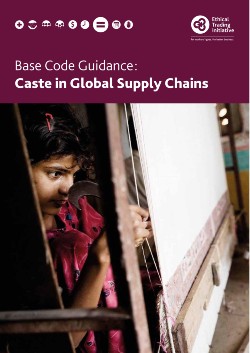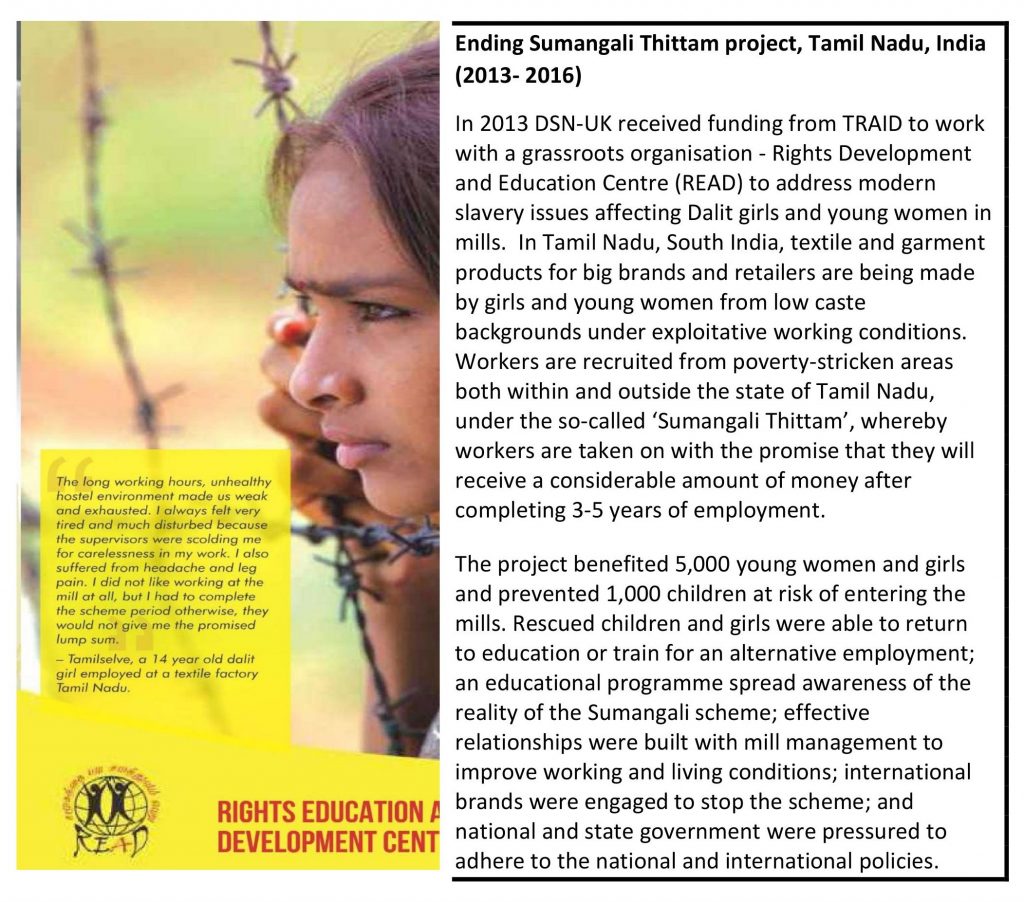Business and Human Rights
Amongst our key priorities, DSN-UK aims to encourage businesses operating in caste-affected countries to introduce measures to address the risks of economic exploitation and caste-based discrimination throughout their supply chains.
Caste is one of the biggest bases of prejudice and discrimination in the world today, depriving people of access to decent work and human dignity, and used to justify slavery and child labour for millions across the globe. Yet many stakeholders concerned with ethical trade, businesses, trade unions and non-governmental organisations (NGOs) alike are not aware of the subject and how it may relate to them.
Many companies are unaware of the discrimination that is perpetrated in countries where their goods are produced. Whilst most have a zero-discrimination policy, there is frequently a lack of understanding about how significant the effects of caste can be for the workforce and how it specifically needs to be addressed.
Some examples of caste discrimination in business operations:
- Exploitation of workers from caste-affected communities, including the use of children and bonded labourers (debt slaves), working under hazardous conditions for minimal pay.
- Poorer working conditions than non-Dalits, including longer working hours, sexual harassment, lesser wages, being assigned the dirtier or more hazardous tasks and facing abusive language and gestures.
- Discrimination in employment practices – qualified applicants from Dalit communities are not considered for skilled jobs and Dalits receive differential treatment.
- Discrimination in the services and utilities offered by an employer, such as housing, health care, and education and training.
- Misappropriation of land belonging to or allocated to Dalit communities.
Addressing discrimination in recruitment remains a huge challenge. Discrimination in urban labour markets in India was demonstrated by research that looked at responses to 4,808 job applications prepared and submitted by the research team for 548 formal private sector jobs. Four applications were submitted for each job: three from identically qualified candidates with either a dominant caste Hindu, or Muslim or Dalit name, and one that was either from an underqualified candidate with a name suggesting a high-ranking individual or a highly qualified candidate with a Dalit name. People with a Dalit or Muslim name were significantly less likely to receive a positive response.
Often it is the conditions under which the work is done, rather than the job itself, which are a barrier to dignity and rights. In construction and stone and mineral extraction, low pay, long hours and lack of facilities or protective equipment are common features. The sector has been slow to mechanise because using Dalits for manual labour is often a cheaper alternative.
Dalits compete in business under very unfavourable terms. They are often unable to obtain the credit, amenities or resources needed for production, or forced to pay higher prices or interest rates for them than more privileged groups. They may also be excluded from markets through ‘untouchability’ practices that make it difficult for them to sell produce for a good price, instead having to depend on middle men to access markets in relationships characterised by power imbalances, exploitation and forced ‘distress sale’ of produce.
Our Partners

The Ethical Trading Initiative (ETI) is a strong ally in our work with businesses. The ETI aims to influence businesses to act responsibly and tackle the complex challenge of global supply chains. Its members include forward-thinking companies, international trade unions and NGOs. ETI’s excellent Base Code Guidance is based on nine fundamental principles: employment is freely chosen; freedom of association and the right to collective bargaining are respected; working conditions are safe and hygienic; child labour shall not be used; living wages are paid; working hours are not excessive; no discrimination is practised; regular employment is provided; and no harsh or inhumane treatment is allowed.
DSN-UK and IDSN have worked closely with ETI to produce their Base Code Guidance: Caste in Global Supply Chains. This document, published in September 2019, gives companies a much greater understanding of the nuances and effects of caste-discrimination and how to deal with the issue.
The ETI Tamil Nadu Multi Stakeholder Advisory Group
DSN-UK is a key member of the core ETI Tamil Nadu Multi Stakeholder Advisory Group (TNMS), which seeks to provide knowledge and training on labour rights issues, health needs of workers and access to benefits within the mills in Tamil Nadu. Approximately 500,000 people work in the region’s textile and garment industry and women are estimated to make up about 60% of the workforce, mostly in unskilled or semi-skilled jobs. The issues of exploited labour in this sector disproportionately affect Dalit women and girls.
ETI Rajastan Stone Group
DSN-UK was the lead NGO in Rajasthan Stone Group (the Group), which was established in January 2012 and aims to build a sustainable model and framework that can help this sector address core labour rights issues. Priority areas include worker health, safety and welfare, worker-management dialogue, staff retention and formalisation of labour. We raised awareness of international labour rights standards amongst local stakeholders, as a first step towards driving long-lasting change for workers, and ending bonded labour.

BUSINESSES
Whether you are a national or international business, caste-based discrimination may be affecting your company.
UK-BASED COMPANIES
If your employees include those who originate from caste-afflicted countries, they may have brought the mind set of caste with them. It is often difficult for employers to spot the signs of caste-based discrimination, so it is important to educate both yourself and your workforce. You should also take steps to include caste in any zero-discrimination policy that you may have.
INTERNATIONAL COMPANIES
Business operations in caste-affected countries are at high risk of being based on the economic exploitation or seclusion of caste-affected communities and others at the ‘low’ end of the caste hierarchy. Violations of both national legislation as well as international law, in particular the international labour standards, often occur. Even if you are a UK company, part of your supply chain may involve caste-affected companies, and it is important to be aware of the damage that you may unintentionally inflict on the Dalit population.
CHECK YOUR OPERATIONS FOR CASTE DISCRIMINATION
If you are concerned that your business is at risk of being affected by caste-based discrimination, please contact us to discuss how our consultancy services can help.
